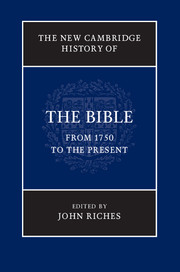Book contents
- The New Cambridge History of THE BIBLE
- Series page
- The New Cambridge History of THE BIBLE
- Copyright page
- Contents
- Figures
- Contributors
- Preface
- Abbreviations
- Introduction
- Part I Producing the Text
- 1 Critical editions and the development of text-critical methods, part 2: from Lachmann (1831) to the present*
- 2 Producing the text: production and distribution of popular editions of the Bible
- 3 Translations of the Bible and the cultural impulse
- Part II New Modes of Study of the Bible
- Part III Reception of the Bible Geographically
- Part IV Reception of the Bible Confessionally
- Part V Thematic Overview: Reception and Use of the Bible, 1750–2000
- Conclusion
- Select bibliography
- Index of biblical manuscripts
- Index of scriptural sources
- General index
3 - Translations of the Bible and the cultural impulse
from Part I - Producing the Text
Published online by Cambridge University Press: 09 June 2015
- The New Cambridge History of THE BIBLE
- Series page
- The New Cambridge History of THE BIBLE
- Copyright page
- Contents
- Figures
- Contributors
- Preface
- Abbreviations
- Introduction
- Part I Producing the Text
- 1 Critical editions and the development of text-critical methods, part 2: from Lachmann (1831) to the present*
- 2 Producing the text: production and distribution of popular editions of the Bible
- 3 Translations of the Bible and the cultural impulse
- Part II New Modes of Study of the Bible
- Part III Reception of the Bible Geographically
- Part IV Reception of the Bible Confessionally
- Part V Thematic Overview: Reception and Use of the Bible, 1750–2000
- Conclusion
- Select bibliography
- Index of biblical manuscripts
- Index of scriptural sources
- General index
Summary
- Type
- Chapter
- Information
- The New Cambridge History of the Bible , pp. 83 - 124Publisher: Cambridge University PressPrint publication year: 2015
- 1
- Cited by

